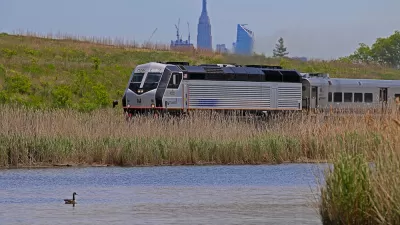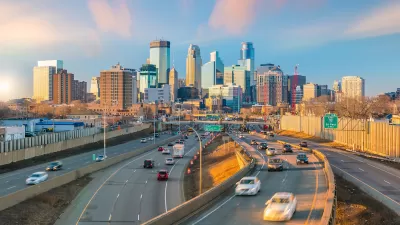The conventional planning wisdom seems to be that long drives are less beneficial to well-being than a short walk. But what about other commuting options?

Last week, I saw something on Twitter I had already seen several times: a link to studies suggesting that people are happier when they can walk to work than when they spend a long time driving to work. This claim strikes me as only slightly less obvious than the claim that water is wet. But at the same time, it raises more questions than it answers. For example:
*Is commuting-related unhappiness limited to driving, or is the long-distance commuter equally dissatisfied whether she bikes, drives, takes a bus, or takes a train? Or to put it another way, does the sheer length of commuting reduce well-being, or is mode choice also an important factor? For example, if a commuter's choice is between a 20 minute drive and a 40 minute subway ride, which is more demoralizing? One British study suggests drivers are as happy or happier than transit users when commuting time is equal; another study disagrees.
*The "short walk/long drive" dichotomy presupposes that work is in a downtown or other walkable neighborhood, while the long drive is from the outer edges of suburbia. But most Americans (including me) work in suburbs. If a commuter's job is in a suburban office park, is he happier living close to the office park, or should he prefer a long ride from a more walkable neighborhood?
*Given that, other things being equal, a short walk is better than a long drive, how should a commuter weigh that factor against other factors? For example, the rent for my current apartment in Manhattan is comparable to the rent for a two-bedroom apartment in Queens, or a three-bedroom house in Suffolk County. As a single person, the extra space is useless to me. But if I had a spouse and a child or two, would the benefits of the extra space outweigh whatever unhappiness I suffered from my commute?
I don't know the answers to any of these questions; I only claim that further research is worthwhile.

Maui's Vacation Rental Debate Turns Ugly
Verbal attacks, misinformation campaigns and fistfights plague a high-stakes debate to convert thousands of vacation rentals into long-term housing.

Planetizen Federal Action Tracker
A weekly monitor of how Trump’s orders and actions are impacting planners and planning in America.

In Urban Planning, AI Prompting Could be the New Design Thinking
Creativity has long been key to great urban design. What if we see AI as our new creative partner?

King County Supportive Housing Program Offers Hope for Unhoused Residents
The county is taking a ‘Housing First’ approach that prioritizes getting people into housing, then offering wraparound supportive services.

Researchers Use AI to Get Clearer Picture of US Housing
Analysts are using artificial intelligence to supercharge their research by allowing them to comb through data faster. Though these AI tools can be error prone, they save time and housing researchers are optimistic about the future.

Making Shared Micromobility More Inclusive
Cities and shared mobility system operators can do more to include people with disabilities in planning and operations, per a new report.
Urban Design for Planners 1: Software Tools
This six-course series explores essential urban design concepts using open source software and equips planners with the tools they need to participate fully in the urban design process.
Planning for Universal Design
Learn the tools for implementing Universal Design in planning regulations.
planning NEXT
Appalachian Highlands Housing Partners
Gallatin County Department of Planning & Community Development
Mpact (founded as Rail~Volution)
City of Camden Redevelopment Agency
City of Astoria
City of Portland
City of Laramie






























